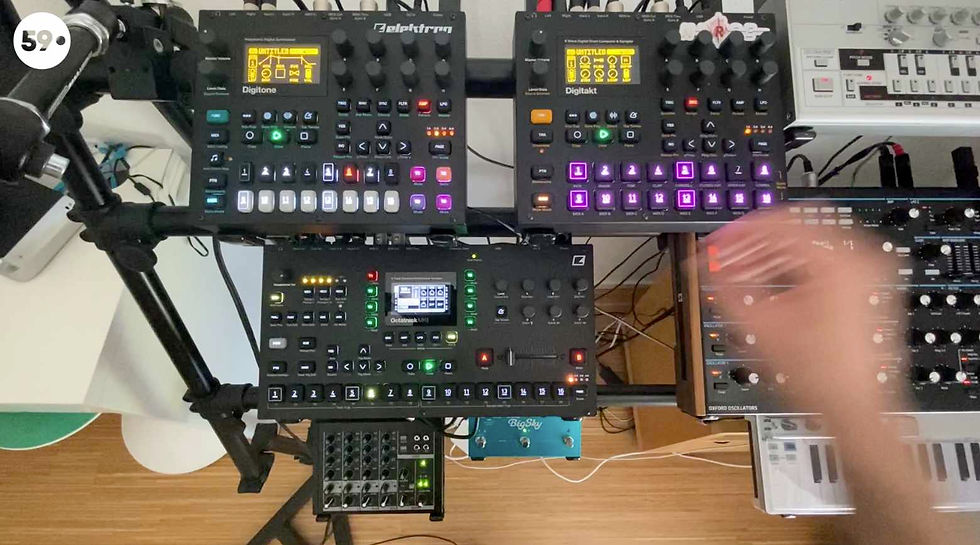Make a track Pt. 1 - Get Inspiration
- 59 Perlen

- Mar 8, 2022
- 4 min read

This blog series takes care of a problem faced by many musicians: the jump from developing a single loop to a complete track. I compiled some best practices from my own workflow that you can use for your own process.
In the first part, I'll cover a number of tips to help you gather inspiration before moving on to idea generation, arrangements and the subsequent mixing and mastering. These topics will be covered in future parts of the series and they build up the production process I usually go through.
Create a template for your setup

To start with, lets talk about templates. I know, this is not a super exciting area, but on the long run, you will be thankful for it because you can rapidly start music making whenever you want.
Whether you work purely DAW-based or use a hardware setup, it's essential to be prepared when inspiration lurks around the corner. And templates can be a huge time saver too.
When I talk about templates, i mean an empty song or project file that's pre-configured with all the settings you typically need in your productions.
For example, an Ableton template could hold your favourite send effects ready to go, a mastering chain, a track with a sampler holding your most frequently used kick samples, tracks for your favourite synths, and so on.

A template for a hardware rig, such as mine, could have pre-defined MIDI channels of your gear, effects could be configured and much more.
The aim of a template is that you can start producing without having to make the same settings over and over again. Plus a template is also ideal for keeping a specific style consistent within a set of tracks.
Search for Samples
Samples are the backbone of most music productions. At the same time, a lot of inspiration can be drawn from them.
Therefore, I recommend paying special attention to their selection and investing some research and time. Especially if you are planning to produce several connected tracks in the form of an EP or an album, it offers the advantage that the individual songs form a unit by using audio snippets that belong together.
You should get into the habit of pre-"mixing" and paying attention to the quality already during the selection process. That means, that you should keep the Audiospectrum on your mind and choose samples wisely to fill the spectrum in the most balanced way.
Gather Sounds and Ideas and create your "Moodboard"

Sources of sounds are many, and one preparatory work to find inspiration is to collect and compile samples with a specific goal on your mind.
This can be thematic, for example, or genre-specific sample packs, holiday field recordings, sampled synth loops or files from free sound archives.
A great way of collecting sounds is a field recorder that can help you snapshot your environment. Read this article for more information about field recording. Field recordings are a fantastic way to make your music unique and develop a signature. I also believe that this brings in a lot of feeling to your work as well.
Another great source of ideas is to browse your existing samples. Pretty often, I find stuff that I've almost forgotten! I'm using a software called XO for this task. It automatically sorts audio material, categorizes them, suggests similar samples and makes it easy to create kits that I then can export as single WAV files. It's also greatly integrated with DAWs. I could dive into my library for hours!

When listening and selecting some of the gathered sounds - your "Moodboard" - you often get ideas and at the same time they give your music that unique flavor.
Process your Samples
Another interesting approach to gather inspiration is to "process" existing material in some way.
For example, you could time-stretch your recordings. "PaulStretch" is an algorythm that's included in Audacity, a free audio editor for Windows, Linux and Mac. It allows lossless stretching of samples up to a factor of 1000, ideal for creating drones and textures that you can use with each DAW or hardware sampler.

Another idea to breathe life back into existing material are the numerous plug-ins of modern DAWs. For example I've had great results with Ableton's "Harmonizer", which pitches the original audio material with several layers in chords. It's definitely worth playing around with the Plugins your DAW offers.
Make a shopping list
This is a tool I use pretty often for planning a release! Most of the time I have an idea in my head of how i want a new song should be. That could be a reference track I like, for instance.
I listen to that track a couple of times and write down some notes - Speed of the track, length, elements, effects and so on. I also draw a sctructure (build up, break, drop, main part, outro). In other words, I describe the track with a couple of adjectives.
Then, I make a to-do list out of my notes and start researching. Each time I found one of the items on this list during my inspiration phase, I check it as done. This really feels like "Shopping" my sample library :D
This way, you can turn the track creation around and start working from a different perspective (which can be pretty refreshing).
How do you get inspired? Let us know in the comments below.
In the next post, we will start putting your inspiration into concrete ideas!



Oh you are using XO!!! I saw a video about it 2 weeks ago - that looks like something really amazing and useful..!!! Nice tip with the shopping list, I wish I was as organized as you :D
I usually start with a sketch on the Digitakt, then record it in ableton, and then I keep adding different things to it like synths and maybe my guitar or shakers etc. This is always a very long process which takes a lot of time and effort, at least for me. ( yes, also with templates haha) Actually, I don´t really enjoy making tracks anymore these days - at least not as much as I did 10 years ago..! I really ha…